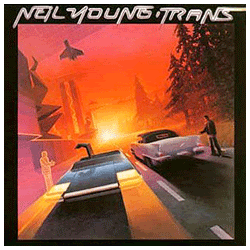
It's incredibly overdue, but I finally bought a copy of Neil Young's Trans on vinyl last night. I'm familiar with the record and the mixed reviews it has received over the years (since it's release in 1982) but I figured I would buy it before I talked about it. I gave it a few really good listens last night, and I have come to the conclusion that it is a solid record. I've been a Neil fan since I was a kid; I overheard my father playing Mr. Young's albums throughout my childhood and have since remained intrigued. This particular record still receives a lot of whining from fans because it's a noticeably different concept. Just from the cover art alone, a Philip K. Dick Do Androids Dream of Electric Sheep theme or some futuristic equivalent comes to mind.
When you play the record, it starts off with classic Neil Young style twangy rock, but by track two you are introduced to something very different from his arsenal of past recordings. It's the use of a vocoder.
The early days of the vocoder must have been exciting. Hearing Kraftwerk chanting robotic commands to their avant garde electronic sounds wasn't something the world expected at the time, but would soon be somewhat familiar with. The technique would be executed into the 70's and 80's with bands like ELO and Alan Parson's Project jumping on the bandwagon. The 90's would see some hints of a vocoder in popular, dance,electronic, and industrial music, but it wasn't until somewhat recently that the vocoder resurfaced with the public acceptance it received in the late 70's. Popular music and Hip Hop would (and continue to) play out the sounds of the vocoder, sometimes even using it to disguise vocalists who cannot stay in key. Neil Young's Trans did just the opposite. He took the tool and mastered it, the way he mastered his trademark guitar sound. He intentionally hit notes while using the vocoder that sounded better than others - notes he wouldn't normally hit when singing without the filter.
Trans is an incredibly genius creation. There are rumors about reasons for his decision to create the album that range from issues with Geffin to some grandiose comment on the inevitable future of electronic pop music and culture/humanity as a whole. I still think there are two simple reasons this record happened.
1) He claimed his autistic son could connect more closely with his music when using the vocoder
and
2) He was doing an awful lot of hanging with the DEVO boys at the time. Watch Human Highway and you will understand.

No comments:
Post a Comment